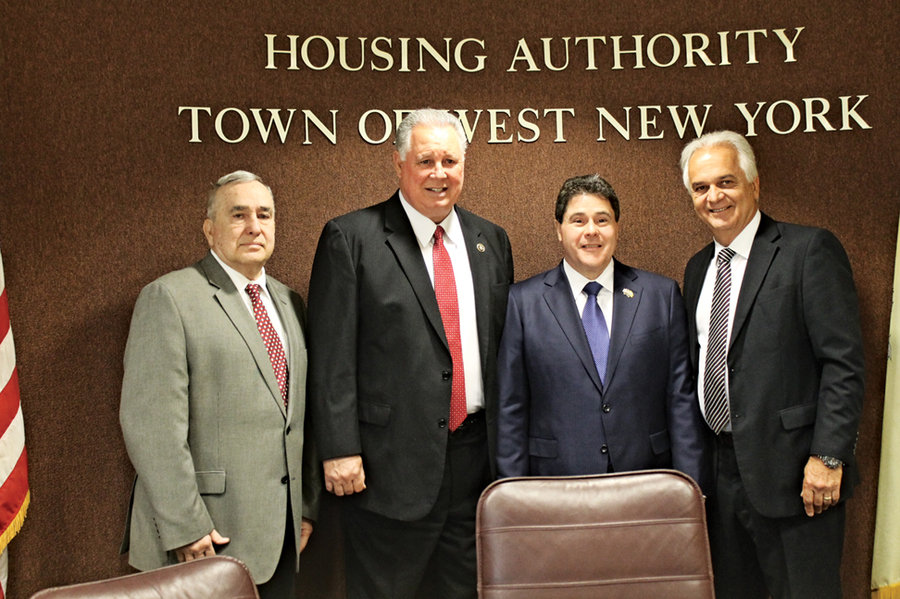Cash-strapped because the U.S. Congress won’t allocate enough funds to make repairs to aging buildings, West New York officials plan to mortgage their senior and other public housing.
The U.S. Department of Housing and Urban Development (HUD) has informed local officials that the city has been selected to participate in the Rental Assistance Demonstration Program (RAD). The voluntary program, overseen by HUD, seeks to preserve public housing by providing Public Housing Agencies (PHAs) with access to more stable funding to make needed improvements to properties.
Nationwide, more than 300,000 units of public housing have been lost from 1990 to 2010 because of chronic under-funding, federal officials said.
According to HUD, public housing units across the country need more than $26 billion in repairs and Congress has not provided the money. As a result, PHAs have had to make tough choices between things like repairing roofs and replacing plumbing – or even demolishing public housing. RAD is being promoted as a way to rehabilitate or repair units without depending on additional money from Congress.
Federal subsidies for the upkeep of these buildings, experts say, began to slip in the early 2000s. Yet despite the clear deterioration of these facilities, local politicians were not able to push through legislation to allocate the needed funds.
To get around the logjam in Congress, HUD is proposing RAD, which allows local housing authorities to mortgage land and buildings to private capital, who then become the landlords and use tax credits to subsidize tenants through project-based, Section 8 contracts. The capital raised would allow the repairs to be made or properties to be rebuilt.
I supported this initiative and the effort to improve our resident’s quality of life.” – Rep. Albio Sires.
____________
Reports have already claimed that RAD, launched only two years ago, will hand over 60,000 units of public housing to private management by the end of 2015. Developers, according to these reports, are lobbying HUD to expand the program to more housing authorities nationwide.
WNY will be biggest RAD in the state
According to Housing Authority Chairman Jose Rodriguez, West New York will be the third and largest housing authority in New Jersey to buy into RAD.
Rep. Albio Sires (D–8th Dist.) said the program would allow the housing authority do repairs and upgrades that would not be possible under the existing funding from Congress.
“This is a well thought-out program,” Sires said.
WNY Housing Authority Executive Director Bob DiVincent called RAD a comprehensive plan that would address the 715 units under Housing Authority jurisdiction. He estimates it would take about $24 million to restore WNY public housing. This plan, he said, would address maintenance and upgrades to existing housing and facilities for up to a 20-year period. This includes major construction such as kitchens, bathrooms and roofs.
The authority will continue to use capital improvement funds until this program kicks in, said DiVincent.
Overall, the program would average out to about $34,000 per unit. The housing authority owns and manages 434 senior apartments and 281 apartments for families with children.
Financing will provide funds
Under the RAD program, the Housing Authority will be working with the Home Finance Mortgage Authority of the State of New Jersey. Money will be pooled from various sources, including a 4 percent tax credit program, private mortgages using local banks, existing capital funds programs, and operating reserves of the Housing Authority.
DeVincent said the housing authority will begin immediately putting together a development team consisting of financial, architectural, engineering, and legal professionals to determine the funds necessary and the best use of those funds. A survey of senior and family apartments will start immediately and work in some areas will begin before summer.
The program ensures that rents will remain affordable and that the quality of life of the tenants does not deteriorate due to budgetary constraints, officials said. The program will also ensure the affordability and stability of these housing units for more than a 20-year period.
“This plan represents one of the Housing Authority’s largest redevelopment efforts. I supported this initiative and the effort to improve our resident’s quality of life,” said Sires.
“We are encouraged by the Housing Authority’s pro-active efforts to redevelop its aging housing stock utilizing HUD’s latest financing options. It assures that our residents will continue to have a decent, safe and affordable place to call home,” said West New York Mayor Felix Roque.
DiVincent said, “West New York received their RAD approval during the second phase of funding and will expeditiously complete the process so it will be able to start rehabilitation efforts as soon as possible.”
DeVincent said work has already started, and would ramp up once the new funding is in place.
RAD has some national critics
RAD is the latest in a number of market-based solutions for the upkeep of public housing including HOPE VI, a federal program that issued grants to developers to tear down distressed public housing units and construct mixed-income communities in their place.
Critics consider HOPE VI a failure, partly because as many 250,000 units have been lost in the process of demolition and rebuilding. Residents were often told they would be relocated but many were not.
Some critics predict RAD will stumble down the same path. While HUD says the long-term preservation of affordable rental housing is RAD’s primary goal, some tenants in these buildings have reportedly questioned whether the federal government would guarantee placement if units have to be demolished.
Some critics claim that private developers will not be bound to maintain the units as public housing once the 20 years – with one renewal – expires.
Al Sullivan may be reached at asullivan@hudsonreporter.com.
